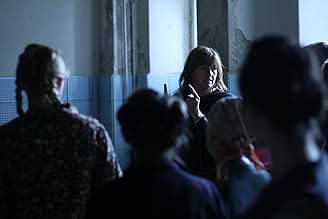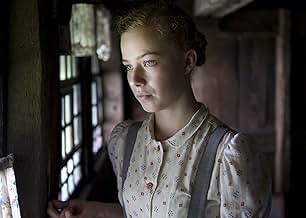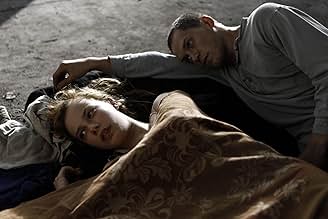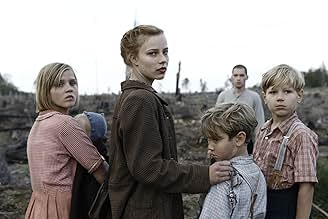Während die Alliierten Deutschland einnehmen, führt Lore ihre Geschwister auf eine Reise, die ihnen die wahren Weltanschauungen ihrer Eltern offenbart. Ein Treffen mit einem mysteriösen Flüc... Alles lesenWährend die Alliierten Deutschland einnehmen, führt Lore ihre Geschwister auf eine Reise, die ihnen die wahren Weltanschauungen ihrer Eltern offenbart. Ein Treffen mit einem mysteriösen Flüchtling zwingt Lore, einem Menschen vertrauen zu müssen, den man ihr beigebracht hatte zu h... Alles lesenWährend die Alliierten Deutschland einnehmen, führt Lore ihre Geschwister auf eine Reise, die ihnen die wahren Weltanschauungen ihrer Eltern offenbart. Ein Treffen mit einem mysteriösen Flüchtling zwingt Lore, einem Menschen vertrauen zu müssen, den man ihr beigebracht hatte zu hassen.
- Regie
- Drehbuch
- Hauptbesetzung
- Auszeichnungen
- 34 Gewinne & 34 Nominierungen insgesamt
- Thomas
- (as Kai Malina)
- Baby Peter
- (as Nick Leander Holaschke)
- Ox Cart Woman
- (as Claudia Geisler)
- School House Woman 3
- (as Hanne Wolharn)
Empfohlene Bewertungen
The ending ties it up well and puts it in proper perspective. Human perspective.
The movie, for me, is largely symbolic, archetypical. Lore is not really a person she IS the immediate post-war Germany.
Everything that she experiences, all her opinions, all the opinions she is exposed to and indoctrinated with, are the points of view of millions of the German populace.
How she deals with it, or denies it is how Germany dealt with and denied it. The 'it' being the entire ethos that permitted/enabled WWII.
In a sense all cultures are a form of mass hysteria, mass hypnotism. Societies indoctrinate as part of their nature, actually part of their definition is the values with which they indoctrinate their populace.
If the values are extreme and violent, the populace often follows. It the society fails at its aims and is physically destroyed, then the population becomes valueless and must die or reinvent itself.
Post WWI German society didn't die, so this is a movie about the pressures, the pressure cooker, in which gave birth to its reinvention.
So, as a piece of symbolic representation, it's magnificent.
There are no plot holes, every bit of dialog, every image, in necessary for understanding.
And patience is required. The viewer assembles all the images, all of Lore's perceptions.
And the pressure cooker cooks.
Superficially this story is about a family of young children who are forced because of Germany's WW II defeat to make their way from the Black Forrest to their grandmother's home near Hamburg in northern Germany. The story concerns the time before that long journey, the incidents of that journey and finally their arrival at their grandmother's home. Sounds simple and straight forward but the devil, as they say is in the details, or rather the story.
As the story unfolds while the children attempt to reach the grandmother's home, the viewer explores through the eldest, who leads this group, many of the consequences of her past history as a child growing in this family with all the mental baggage implied by this maturation. The drama is carried by this eldest child, Saskia Rosendahl, to whom many of the film's incidents occur.
Moviegoers might be struck by the close-ups used by the director; most of the movie's shots are taken at that range and viewers may not like the method. It contributes to an extremely distinct film, along with the story as well as Rosendahl's superb acting, which must affect the viewer and this after all is why we attend movies to begin.
In this case, it's the situation in Germany just after the victory of the allied forces. It's a very interesting perspective, because things get turned around. The Nazis are no longer powerful rulers, but hapless losers, afraid to get caught by the Americans. And the Jews, although still despised by most Germans, are the ones who get things done with the allied troops.
The movie shows a country in an almost apocalyptic state, with dead people and destructed buildings everywhere. Citizens can't trust each other and are willing to do anything for some food or transportation. The powers are constantly shifting; an ally can suddenly turn into an enemy.
It's in this utterly destructed and disheartened country that a family without parents is finding its way, led by Lore, a girl of approximately 16 or 17 years old. Her parents, high-ranking Nazis's, have left her to hide from the Americans, and it's up to her to lead her younger sister and three little brothers (of which one is still a baby) to her grandmother in the north of the country. They have to beg for food and shelter, sometimes paying with the jewels her mother left behind.
Australian director Cate Shortland is very good in capturing the mood of desperation and defeat. She uses faded colours, almost like a Polaroid picture, and shows lots of close-ups. Not only of faces, but also of hands, feet, clothes and shoes. It accentuates the oppressive atmosphere in post-war Germany, and the terrible fate of the children. The story gets a twist when the children meet a young man, who for some reason is willing to help them. The relationship between Lore and the young man is ambiguous, for several reasons.
'Lore' is not easy to watch. There are several disturbing and gruesome scenes in the film. But it's a gripping tale of the human urge to survive in almost inhuman circumstances. And most of all, it reminds us of the utter horrors of war. This war, and any war.
As I said, it's immensely complicated. It feels like a slice of life even if it is fiction. The cinematography is excellent. The lead actress, all of 19 in real life, is obviously very talented. I gave the film a 7 out of 10 because it's a bit too disjointed for my tastes, but perhaps that's an effective way to portray Germany's disarray at the end of the war.
As the German army collapses in the spring of 1945, the breakdown of a family serves as a microcosm of a country in despair in the closing days of World War II. Lore (Saskia Rosendahl) and her four younger siblings are abandoned as their Nazi- supporting parents are forced to flee the Allied forces. As they travel on foot to their grandmother's house in Hamburg, the children encounter a young Jewish refuge, Thomas, on whom they are forced to rely for both food and safe passage through Ally-occupied lands. As she is exposed to the lies of their parents, and begins to develop feelings for one whom she has been taught to hate, Lore is forced to come to terms with a belief system that is quickly unraveling.
It's the children that have to do all the heavy lifting in the film dramatically, and they carry their weight, and then some. The film is anchored by a remarkable lead performance from Rosendahl, who comes across as a seasoned veteran, despite this being her debut performance. Her character goes from obnoxious adolescent to young adult, via a series of confronting moments where her morals and beliefs are challenged. Her vibrant youthful spirit is replaced with a burning rage with a war torn Europe as the backdrop.
A new perspective on an event often forces an audience to confront disturbing realities they may wish to avoid. Although "Lore" relates a story from the second world war, it reveals the point of view of those we do not often consider: children of a high-ranking Nazi official. This story may not be pleasant, but it is certainly fascinating.
Wusstest du schon
- WissenswertesThe family photographs in the wallet that Lore looks at are pictures of director Cate Shortland's husband's family.
- PatzerThe derelict tank the children pass in the forest is a post-WW2 manufactured Russian T-54/55 or T-62 tank. The balk cross painted on the turret is indicative of an early war paint scheme. Later in the war the 'lines' were thicker.
- VerbindungenFeatured in Film '72: Folge vom 13. Februar 2013 (2013)
- SoundtracksJugend will marschieren
(Alte Aufnahme)
Folksong
Arranged by Lisa Carlyna Zumpano (ASCAP)
Published by Audiosparx (ASCAP)
Top-Auswahl
- How long is Lore?Powered by Alexa
Details
Box Office
- Budget
- 4.300.000 € (geschätzt)
- Bruttoertrag in den USA und Kanada
- 970.325 $
- Eröffnungswochenende in den USA und in Kanada
- 31.498 $
- 10. Feb. 2013
- Weltweiter Bruttoertrag
- 2.362.019 $
- Laufzeit1 Stunde 49 Minuten
- Farbe
- Sound-Mix
- Seitenverhältnis
- 1.85 : 1
Zu dieser Seite beitragen





























